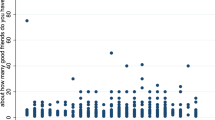Abstract
This article departs from the traditional welfare analysis of social status seeking by incorporating scale economies, product differentiation, and monopolistic competition into a model. I argue that social status seeking could be welfare improving rather than the usual conclusion that social status seeking is welfare-reducing, under some assumptions that are not particularly strong. Market distortions of the quantity–variety and consumption–leisure trade-off may be corrected by social status seeking. Since modern societies are arguably closer to monopolistic competition than perfect competition, we may also need to rethink the long-held belief that the welfare effects caused by social status seeking are usually negative.
Similar content being viewed by others
References
Boskin MJ, Sheshinski E (1978) Optimal redistributive taxation when individual welfare depends upon relative income. Q J Econ 92: 589–601
Blanchard OJ, Kiyotaki N (1987) Monopolistic competition and the effects of aggregate demand. Am Econ Rev 77: 647–666
Brakman S, Heijdra BJ (2004) Introduction. The monopolistic competition revolution in retrospect. Cambridge University Press, Cambridge
Brekke KA, Howarth RB, Nyborg K (2003) Status-seeking and material affluence: evaluating the Hirsch hypothesis. Ecol Econ 41(1): 29–39
Dixit AK, Stiglitz JE (1977) Monopolistic competition and optimum product diversity. Am Econ Rev 67(3): 297–308
Eaton BC, Lipsey RG (1989) Product differentiation. In: Schmalensee R, Willig RD (eds) Handbook of industrial organization, vol 1. North-Holland, Amsterdam
Frank RH (1985) The demand for unobservable and other nonpositional goods. Am Econ Rev 75(1): 101–116
Helpman E, Krugman PR (1985) Market structure and foreign trade: increasing returns, imperfect competition, and the international economy. The MIT Press, Cambridge
Hirsch F (1976) Social limits to growth. Harvard University Press, Cambridge
Johansson-Stenman O, Carlsson F, Daruvala D (2002) Measuring future grandparents’ preferences for equality and relative standing. Econ J 112: 362–383
Krugman PR (1979) Increasing returns, monopolistic competition, and international trade. J Int Econ 9: 469–479
Ng S, Ng Y-K (2001) Welfare-reducing growth despite individual and government optimization. Soc Choice Welf 18(3): 497–506
Pigou AC (1948) The economics of welfare. Macmillan, London
Scitovsky T (1976) The joyless economy: the psychology of human satisfaction. Oxford University Press, Oxford, New York
Seidman L (1987) Relativity and efficient taxation. South Econ J 54: 463–474
Stiglitz JE (1987) Pareto efficient and optimal taxation and the new new welfare economics. In: Auerbach AJ, Feldstein M (eds) Handbook of public economics, 2nd edn. Elsevier, Amsterdam, pp 991–1042
Author information
Authors and Affiliations
Corresponding author
Rights and permissions
About this article
Cite this article
Woo, W.C. Status and welfare under monopolistic competition. Soc Choice Welf 36, 227–239 (2011). https://doi.org/10.1007/s00355-010-0472-7
Received:
Accepted:
Published:
Issue Date:
DOI: https://doi.org/10.1007/s00355-010-0472-7




